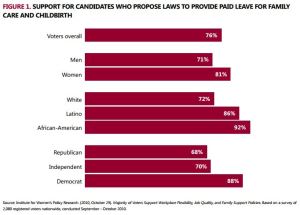Expecting Better, a recent report by the National Partnership for Women and Families, tells a story most parents in America already know: outdated family leave laws are making pregnancy and parenthood especially difficult for working parents.
The report takes a critical look at federal family leave policy in the U.S. – one of only a handful of countries that does not require paid family leave insurance – and also scores each state on a number of factors.
Washington state’s report card was good: we earned a ‘B’, behind only four other states and Washington, D.C. But it wasn’t all good news: 18 states were given F’s, and not a single solid ‘A’ was awarded.
No U.S. state offers both paid family leave for births and adoptions, as well as job protection to all parents taking leave. Gaps in the federal Family and Medical Leave Act (FMLA) means millions are not covered, and most of those that are may take only unpaid leave. By contrast, 178 countries guarantee paid leave for new mothers and 54 offer it to new fathers.
Without legal protection, workers rely on the goodness of bosses and employers, many of whom have cut back on benefits. Only 9% of employers offer fully paid maternity leave and only 11% of private sector workers work at firms that offer leave to fathers or adoptive mothers.
Workers without family leave often piece together sick leave and vacation, but fully 23% of private sector workers have no paid vacation, 37% have no paid sick leave, and women are less likely to have these benefits. Similarly, low-income workers who can least afford to take unpaid leave are less likely to have paid time off, and are more likely to work at firms exempt from the FMLA.
Washington state deserves credit for having family protection laws stronger than most states. While our paid parental leave program has not yet gone into effect, Washington has an expanded FMLA law that allows workers to take unpaid leave to care for a registered domestic partner, provides greater access to pregnancy disability leave for women, and allows for flexible use of paid sick time.
Paid leave also has many societal benefits. Research shows parental leave makes mothers and children healthier, helps businesses by increasing worker loyalty and reducing turnover, and makes the economy stronger by increasing families’ economic security and reducing reliance on public aid.
 Many Americans face the same challenges of balancing work and family in a changing economy, so it should come as no surprise that there is overwhelming public support for strengthening family leave policies. American families and workplaces have changed since the 1950s – and our workplace policies need to keep up.
Many Americans face the same challenges of balancing work and family in a changing economy, so it should come as no surprise that there is overwhelming public support for strengthening family leave policies. American families and workplaces have changed since the 1950s – and our workplace policies need to keep up.
By EOI Intern Pete Stewart
More To Read
May 19, 2025
A year of reflections, a path forward
Read EOI Executive Director's 2025 Changemaker Dinner speech
March 24, 2025
Remembering former Washington State House Speaker Frank Chopp
Rep. Chopp was Washington state’s longest-serving Speaker of the House
February 11, 2025
The rising cost of health care is unsustainable and out of control
We have solutions that put people over profits

